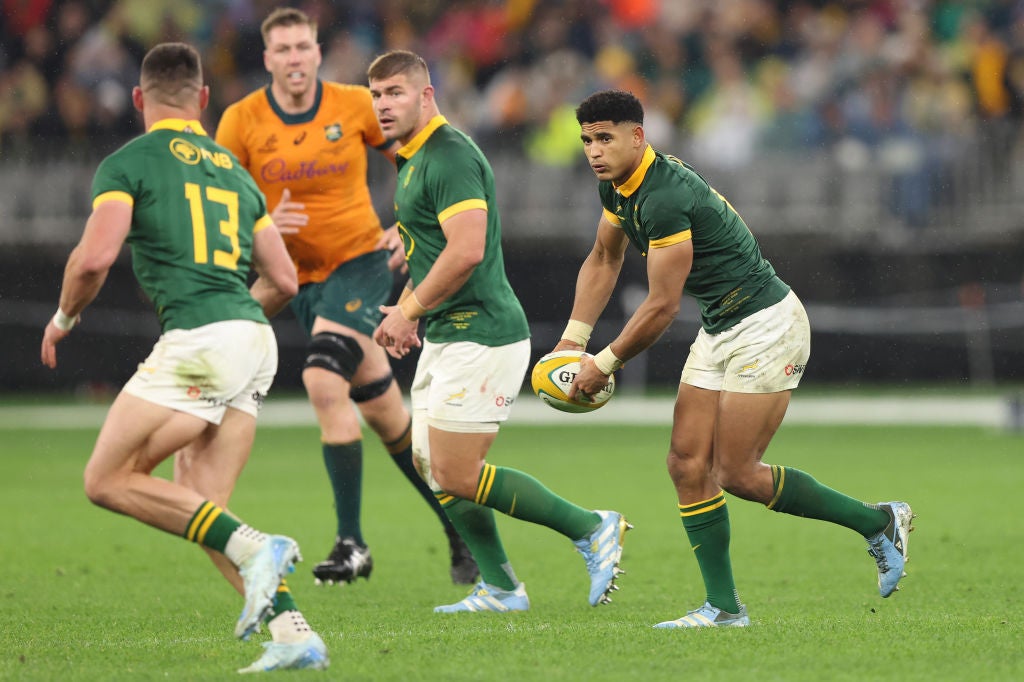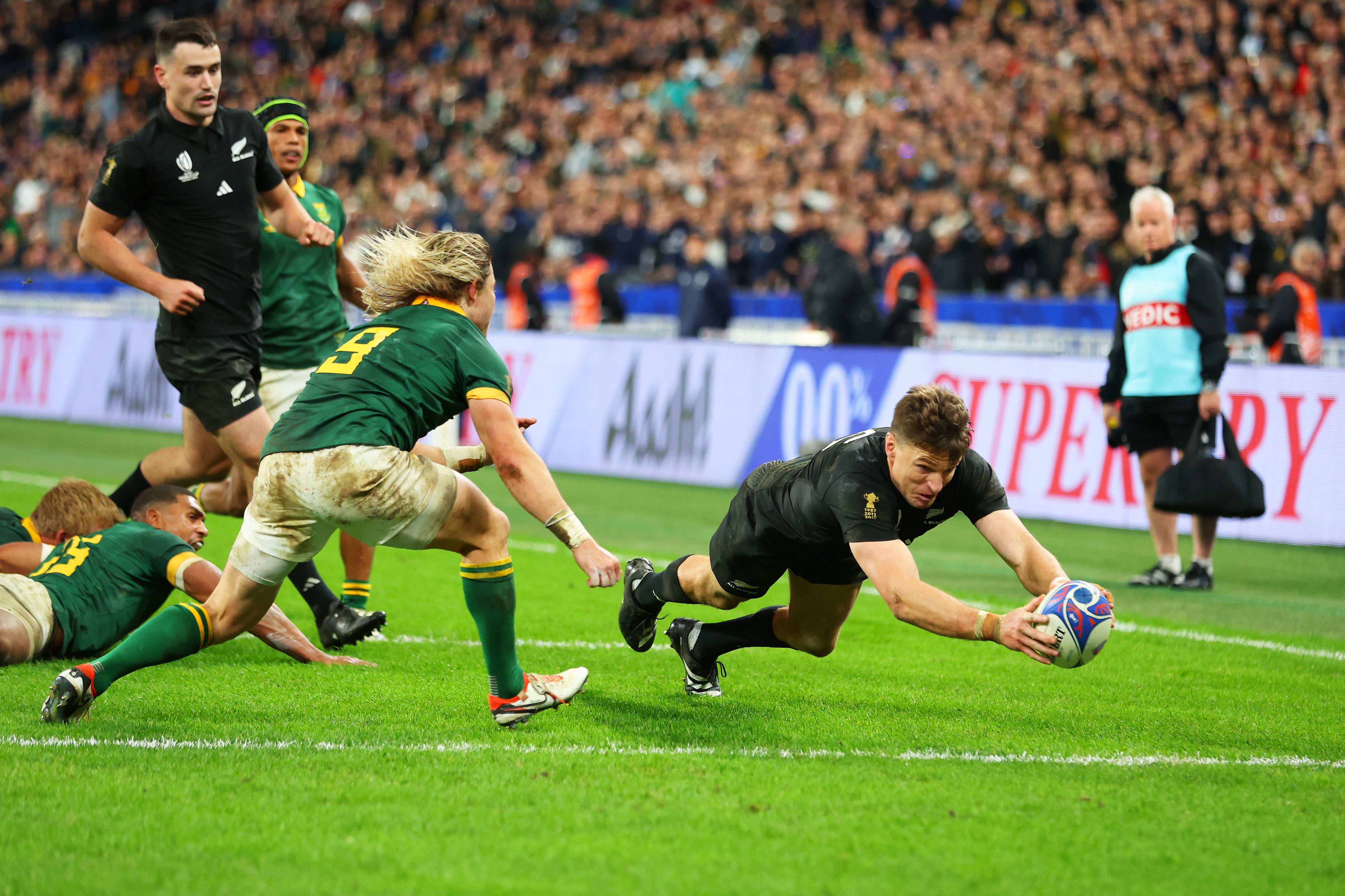Springboks and All Blacks collide again as rugby’s tectonic plates shift on and off the pitch
The Springboks look set to secure the Rugby Championship as the two fierce foes renew their rivalry in Cape Town this weekend, but it may be off the pitch where the more significant battles are about to be fought

Your support helps us to tell the story
From reproductive rights to climate change to Big Tech, The Independent is on the ground when the story is developing. Whether it's investigating the financials of Elon Musk's pro-Trump PAC or producing our latest documentary, 'The A Word', which shines a light on the American women fighting for reproductive rights, we know how important it is to parse out the facts from the messaging.
At such a critical moment in US history, we need reporters on the ground. Your donation allows us to keep sending journalists to speak to both sides of the story.
The Independent is trusted by Americans across the entire political spectrum. And unlike many other quality news outlets, we choose not to lock Americans out of our reporting and analysis with paywalls. We believe quality journalism should be available to everyone, paid for by those who can afford it.
Your support makes all the difference.South of the Equator, the tectonic plates of rugby are shifting. Secure back-to-back wins against New Zealand this weekend and South Africa will all but make certain of a rare Rugby Championship crown, knocking the All Blacks of a throne they have occupied for most of the last two decades.
As any Springboks fan will tell you when discussing even a tenuously tangential topic, South Africa now have four World Cup wins to New Zealand’s three, but their record in this competition has been curiously poor. Since the transformative arrival of Rassie Erasmus, they have won the Rugby Championship just once; in the last two decades, that tally of titles grows only to three.
A fourth crown would be significant but it is how South Africa have evolved since their triumph in Paris last October that is more impressive. If there was a criticism of Siya Kolisi’s side on their runs to glory in Japan and France, it was of a gameplan built around simple, super strengths: forward might, kicking accuracy, suffocating defence.
Brilliant though the Springboks were, their transformation in recent months may be creating a more complete team for all courts. Though Handre Pollard is favoured this weekend, the installation of Sacha Feinberg-Mngomezulu at fly half has proved equally bold and brilliant, with the versatile Stormer establishing himself quicker than anticipated.

Attacking tweaks developed by assistant coach Tony Brown – a poached Kiwi – have shown off hereto more seldom seen elements of dynamic back play. Where in the past it is to New Zealand that the rest of the rugby world has looked for innovation, it now appears that it is South Africa who are ahead of the game.
Who, though, would rule out the All Blacks reminding their hosts of their class in Cape Town? South Africa need only look to a month ago when they followed a shock defeat in Wellington with an Auckland rout of Argentina to see how New Zealand usually respond to a set-back. With Beauden Barrett back on the bench in a closing role he excelled in against England earlier this year, the All Blacks hope to match the impact of South Africa’s “Bomb Squad”.
“We had a game on the weekend where we had the opportunity to win. We have another opportunity this weekend," head coach Scott Robertson said. "We have to be better at finishing games."
But for all the intrigue on the field, it may be off it where the more interesting battles are currently being fought. This has been a busy week of news in rugby’s continuing fight for financial sustainability as the future continues to be mapped out. Pleasing news came thorugh on Friday of governance reform within New Zealand Rugby that will hopefully end the infighting that has been commonplace in the last few months.

South Africa, meanwhile, have relative strength and stability. The Springboks are understood to have appointed sports marketing giants Wasserman to look at ways of further developing their brand, noting the global cut-through that their opponents enjoy. With a charismatic captain, a diverse squad full of fascinating tales and the garlands and glory of back-to-back World Cup wins, Erasmus’s side is mightily marketable.
There are signs of a desire to develop the pair’s duopoly, too. Long-standing rumours of a touring agreement between the two nations appear to be coming closer to fruition, with the All Blacks likely to tour South Africa for three Tests and a number of midweek fixtures in 2026. Quite exactly what this would mean for Australia, Argentina and the Rugby Championship is unclear – but it is clearly a concern for three rugby entities in need of succour.
Ensuring the Wallabies and Pumas are adequately supported (and developing nations like Japan and Fiji brought through) must be a priority but you can understand the need to look beyond the bounds of this tournament. Despite an enduring legacy as one of the sport’s premier competitions, the Rugby Championship has always been a strangely difficult event to sell. The geographical realities of a competition drawn from right across the Southern Hemisphere has made television rights complex, while time-zone difficulties also have knock-on impacts for commoditising the event.

Sanzaar, the body that oversees the annual event, is impotent compared to the Six Nations – as shown when the latter body put the kibosh on a lucrative bid from Qatar to host the finals of the new Nations Championship that Sanzaar favoured. A European host is now likely.
Reports in Australia suggest that the Rugby Championship could move to a biennial event if South Africa and New Zealand get their touring agreement – dubbed "Rugby’s Greatest Rivalry" – fully signed off. The ramifications would be wide-reaching but as a pure sporting spectacle, more Springboks vs All Blacks clashes would be a good thing, as the pair showed in Johannesburg last week.
The snappy tagline for the new tours would ring true. Last Saturday’s meeting at Ellis Park evoked memories of 1995 and the World Cup final that helped unite South Africa, while a trip to Cape Town has required more nuanced discussion of political and rugby history. Plenty of fans in the city historically supported the All Blacks under the Apartheid regime with the then-all white Springboks seen as a symbol of segregation.

Kolisi and his side have successfully changed many of the perceptions of what the South African rugby team can be to the Rainbow Nation, as will be displayed at a sold-out DHL Stadium. “We had a great trophy tour here after the World Cup with great support all over South Africa. Hopefully we have won over more support,” wing Cheslin Kolbe said this week.
“Yes, the All Blacks do have a good support base in Cape Town, but I’m sure the majority of supporters will be cheering on the Springboks. The only thing we can do more is to win, and hopefully earn a bit more respect here.”
Join our commenting forum
Join thought-provoking conversations, follow other Independent readers and see their replies
Comments